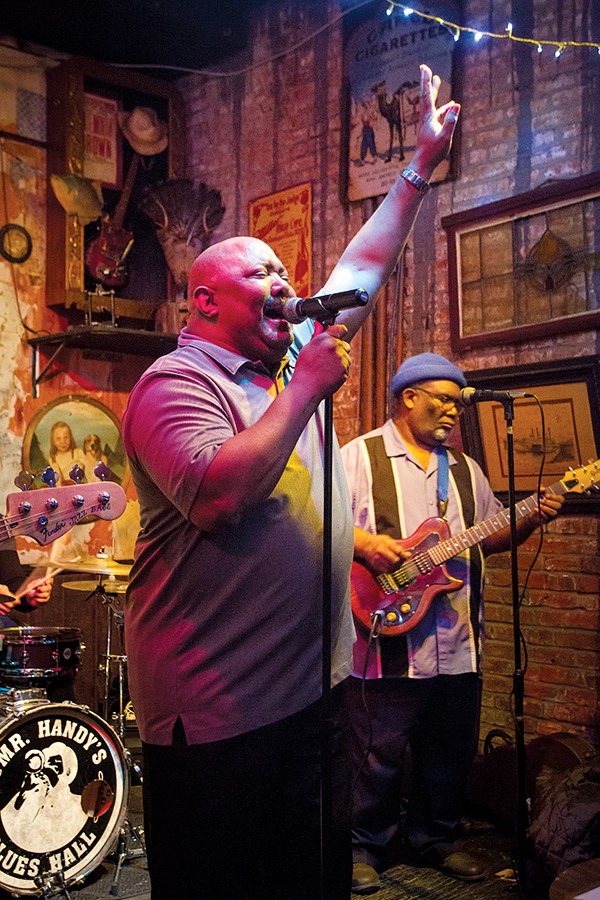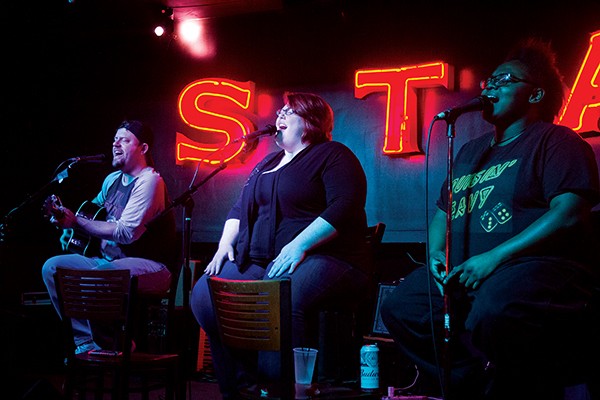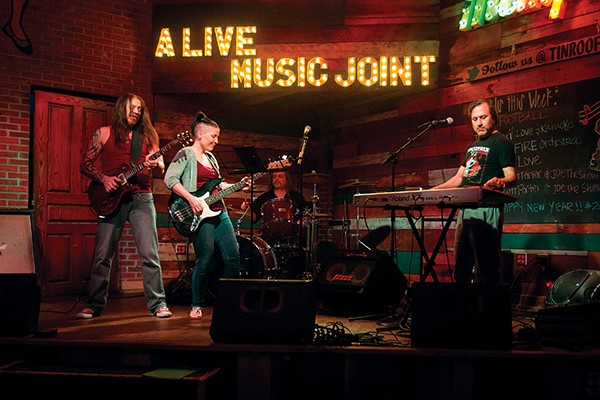It’s a little past 9 p.m. on Beale Street when Gracie Curran starts another set with the High Falutin’ Band. The restaurant side of the Rum Boogie Cafe is half full, a pretty good crowd for a Monday in January. It’s “slow season” on the world famous Beale Street — weeks before the International Blues Challenge brings thousands of tourists from around the globe to the two-block zone, and months before the warm weather brings the big crowds — but Curran works the room as if it’s the last concert of her life. Since forming the band in 2010, she says she’s approached every show this way. She says anyone who’s ever performed on a stage knows that a Monday night is what you make it.
“There’s a different energy on Monday nights than on the weekends,” Curran explains. “It’s nice to play to people who came here to see Memphis music, no matter what day it is. It’s a big responsibility.”
Curran considers herself a cheerleader or a “chaperone of a good time” when she’s on stage. She never plays with a set list and often asks the crowd what they want to hear. Like any good entertainer, she realizes it’s her responsibility to provide her audience with a temporary refuge from the outside world.
“I remember having an office job and working 70 hours a week, so I don’t take for granted getting to tour the country and put everyone in a good mood. Lately there’s been a lot of talk about the political climate, but I want to take you away from all of that,” Curran says.
“That’s what the blues is for. We all go through stuff — everyone has a struggle — but I want to take you away from that. I love it, and I appreciate it so much. We get to come home from tour and play Beale Street; that’s the best thing in the world to me.”
With a voice like Curran’s, luck has little to do it with it. But that sense of gratitude is something that can be found in just about every other performer on Beale, regardless of what kind of music they play.
Matt Isbell of Ghost Town Blues Band has no problem admitting that Beale Street shaped his musical career. He’s played the street more than 300 times. His band won second place at the 2014 International Blues Challenge and built an international fan base in the process.
“Playing on Beale during the week, you catch a lot of people doing the Southern United States vacation thing, or maybe there’s some convention or something, which means you have the chance to get national exposure in your own backyard. People from other cities will have already seen your band when you go there on tour. Other bands in other cities don’t have that resource. It’s kind of like a built-in fan base in your own backyard.
“If it weren’t for [our playing] Beale Street, we probably wouldn’t have gotten second place at the IBC. We wouldn’t have played B.B. King’s funeral, and we probably wouldn’t be a national touring band.”
Beale Street Booker
Carson Lamm has been booking on Beale Street for almost 20 years, and his history on the street goes back even further. Lamm oversees booking at the Rum Boogie Cafe, the Blues Hall, the Tap Room, and King’s Palace. If you’ve ever wandered into a bar post-Tigers or Grizzlies game, there’s a good chance you’ve seen a band he’s booked.
“I think the cool thing about Beale Street is that some of the guys who play weekdays with us are the same artists that have a national fan base and travel on the weekend,” Lamm said.
“They’re in town doing what they do on a smaller stage, but you still get that quality show. It’s kind of like playing without the safety net, so a lot of times artists will try new things. I booked the North Mississippi Allstars in 1998 at the Blues Hall on Sunday, Monday, and Tuesday, and they used the venue as a breeding ground for writing new songs and trying new things.”
“They’d have a new part of a song that they’re basically writing in front of an international audience. I remember Luther going, ‘Hey man, is it okay if my dad shows up to the gig?’ Then Jim Dickinson would show up, and he’d take it to a whole other level. People like Gracie and the Ghost Town Blues Band represent Memphis on a national stage, and Beale Street is their home base.”
King of the Blues Hall
While the days of the Dickinson brothers playing Monday nights on Beale are gone, there’s another band kicking up dust weekly at the Blues Hall. At first sight, the McDaniel Band might not seem like anything special. You won’t find them in fancy costumes or flexing flashy instruments. But sit in the Blues Hall and listen for five minutes, and you’ll quickly see why the band just might be the best-kept secret in Memphis.
Like many Memphis musicians, Chris McDaniel started singing in church when his age was still in the single digits. His mother was also a singer, and McDaniel said that he hasn’t looked back since the first time he heard the Jackson 5.
 Don Perry
Don Perry
The McDaniel Band plays Tuesdays and Wednesdays at the Blues Hall.
“We’ve been down there [at the Blues Hall] for the past three years. I also [perform] a little bit at B.B. King’s when they need me, but I started out in Handy Park and things just moved on up. We kept getting better musicians in the band, and now we do everything from the Rolling Stones to the Allman Brothers to Howlin’ Wolf. We keep a crowded house because we do songs that everyone knows and likes.”
There’s something spiritual about this band. It’s like going to church — if the reverend was handing out Big Ass Beers. They connect. Those in the crowd seem quick to realize that the McDaniel Band takes each performance seriously. McDaniel often addresses members of the crowd and dedicates the song “Stand by Me” to American veterans every time he sings it.
“I had an uncle and two cousins die in Nam,” McDaniel says. “I have another uncle who served 22 years in the Navy, and a lot of other folks in my family were military.
“You look out on the streets, and you see homeless veterans, so when I sing ‘Stand by Me,’ I want people to know how grateful we should be for their service. They allow us to do the things we’ve done. I’ve had so many guys from Vietnam come and shake my hand, and they have tears in their eyes, and it brings tears to my eyes, as well. People come up to me and say thank you because they don’t get that everywhere they go. Someone has to speak out and say something about it, and I’m just glad I’m in a place where I can meet people from all over the globe and share that.”
 Don Perry
Don Perry
Cruisin’ Heavy plays Mondays and Tuesdays at Alfred’s on Beale Street.
 Don Perry
Don Perry
Roxi Love plays at Tin Roof on Beale Street in downtown Memphis.
The Street Remembers
Logging long hours on Beale Street means spending time away from friends and family. Making a living playing music might seem ideal to many, but life in the spotlight night after night takes a toll, no matter how many people are applauding. Many Memphis musicians consider Beale Street their home away from home. And when someone in the Beale Street family goes home for the last time, the street holds a funeral procession.
“Basically, a tradition on Beale Street is that people who were either involved or played on the street will have their final procession down Beale. It really is an arm of what was the Memphis Music Commission,” Lamm says.
“When B.B. King passed away, we had to organize 20 horn players. We’ve done big ones like those, and we’ve done small processions with six horn players.
“It’s really an organic and cathartic process, because a lot of the people who show up knew the musicians. It’s their final stroll down Beale Street; it’s paying the ultimate respect to someone to play in their procession.
“I had to start a Facebook page for when B.B. King died, because so many people wanted to be a part of it. It’s a process that musicians and the families appreciate. We don’t advertise it. It just happens.”
McDaniel was close to legendary Beale Street singer James Govan, who was honored with a Beale Street funeral procession after his death in 2014.
“I loved James Govan,” McDaniel says. “There was no voice like his on Beale Street. I’d walk away from my set sometimes to catch him sing. I still think about him and talk about him all the time. If I do ‘These Arms of Mine’ by Otis Redding, I always mention his name.”
The gratitude shown on Beale is a two-way street. When you ask a musician about performing in one of the many world-famous clubs on the downtown stretch, the words “thankful” and “lucky” are used without hesitation.
While there are certain events — Beale Street Music Fest, the International Blues Challenge, and bike nights — that serve as high-profile functions and draw in the crowds, any night’s a great night to catch a band on Beale, even Monday. Or maybe, especially Monday.